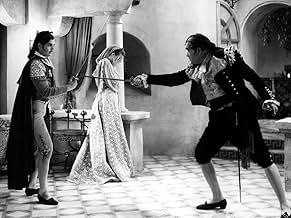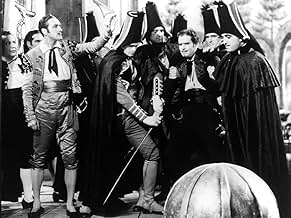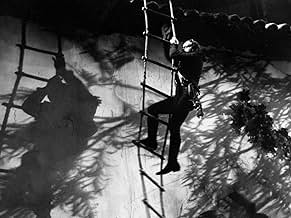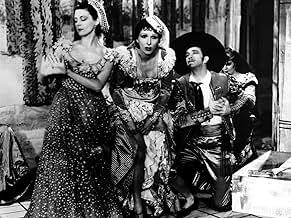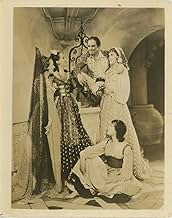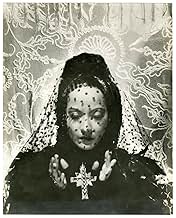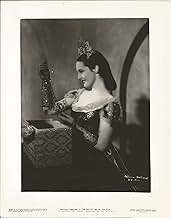PUNTUACIÓN EN IMDb
6,3/10
825
TU PUNTUACIÓN
Don Juan está envejeciendo. Llegó de forma clandestina a Sevilla tras veinte años de ausencia. Su esposa Dolores con la que no ha vivido en cinco años, desea vengarse de él por haberla aband... Leer todoDon Juan está envejeciendo. Llegó de forma clandestina a Sevilla tras veinte años de ausencia. Su esposa Dolores con la que no ha vivido en cinco años, desea vengarse de él por haberla abandonado tanto tiempo.Don Juan está envejeciendo. Llegó de forma clandestina a Sevilla tras veinte años de ausencia. Su esposa Dolores con la que no ha vivido en cinco años, desea vengarse de él por haberla abandonado tanto tiempo.
- Dirección
- Guión
- Reparto principal
- Premios
- 1 premio y 1 nominación en total
Barry MacKay
- Rodrigo The Impostor - A Man of Romance
- (as Barry Mackay)
Claud Allister
- The Duke - A Dukes Go
- (as Claude Allister)
Reseñas destacadas
"The Private Life of Don Juan" is a 1934 comedy from Alexander Korda and is notable as the swan song of screen legend Douglas Fairbanks. The Don Juan character comes from a 14th Century Spanish play, several books and plays (including works by Byron and Moliere) and the Mozart opera Don Giovanni (1787). The first film was in 1926 starring John Barrymore. Don Juan would be played later by Errol Flynn (1949) and Johnny Depp (1995).
Douglas Fairbanks Sr. was one of the biggest stars in the early years of Hollywood, referred to as "The King" of Hollywood. Along with Chaplin, DW Griffith, and Fairbank's wife, Mary Pickford, he founded United Artists (1919). He founded the Motion Picture Academy (1927) and was its first President, was the first to put his hands and feet in the cement at Grauman's Chinese Theatre, and hosted the first Oscar ceremony in 1929.
Fairbanks virtually invented the swashbuckler film and appeared in such classics as "The Three Musketeers" (1921), "Robin Hood" (1922), and "The Thief of Bagdad" (1924). He wasn't really known for his lothario roles, which were more the focus for his contemporaries Valentino and Barrymore.
Fairbanks was in England along with his son, looking for work, when he came upon Alexander Korda and hence this film. Korda loved film biographies - "The Private Life of Henry VIII" (1933), "The Private Life of Helen of Troy" (1927), "Rembrandt" (1936), "That Hamilton Woman" (1941), and "Bonnie Prince Charlie" (1948) – and while the character Don Juan is more fiction than fact, he was so well known it does take on an historical tone
Merle Oberon plays one of Fairbank's love interests. She started in films in 1928 but it was her role as Anne Boleyn opposite Charles Laughton in Korda's "The Private Life of Henry VIII" (1933) that brought her to stardom. She was nominated for an Oscar for "The Dark Angel" (1935) but is probably best remembered for her role as Cathy in "Wuthering Heights" (1938). Oberon appeared in several Korda films and eventually they married in 1939 and then divorced in 1945 when she married cinematographer Lucien Ballard.
Binnie Barnes plays a maid. Barnes was a major star of the 30s, appearing in "Private Life of Henry VIII" (1933), "Diamond Jim" (1935), "Last of the Mohicans" (1936) and "3 Musketeers" (1939). Her philosophy was - "I'm no Sarah Bernhardt. One picture is just like another to me as long as I don't have to be a sweet woman."
French born Georges Perinal (1897-1965) is the photographer. He worked often with Korda (Henry VIII, Rembrandt, Catherine the Great) and won an Oscar for "The Thief of Bagdad" (1940) and was nominated for "Four Feathers" (1939).
The NY Times called the film "a visually attractive costume comedy" but disliked Fairbanks' performance noting - "the microphone is ruthlessly unkind to him. Neither in voice nor theatrical skill is he gifted to read lines."
1934 was an OK year for films. The top box office slots went to "Viva Villa", "Cleopatra" and "The Barretts of Wimpole Street" and "It Happened One Night" was the big Oscar winner. That year "The Thin Man" series began, Karloff and Lugosi appeared in "The Black Cat", Fred Astaire and Ginger Rogers danced in "The Gay Divorcée", Laurel and Hardy laughed it up in "Babes in Toyland", and Howard Hawks' "Twentieth Century" came out.
The aging Fairbanks is marvelous as the aging lothario, and one can't help but make comparisons with John Wayne's "The Shootist" (1976), Edward G Robinson's "Soylent Green"(1973), Errol Flynn's "Too Much too Soon" (1958) or John Barrymore's "The Great Man Votes" (1939). Fairbanks is particularly good when philosophizing about the vagaries of fame and the problems of growing old.
This isn't the best film, but it is an opportunity to see the famous Douglas Fairbanks in a talkie and in a role that requires acting rather than swashbuckling alone. His voice is a bit disappointing and his acting skills are not terrific, though they are certainly acceptable. He is surprisingly agile as the 52 year old demonstrates throughout the film. Although his contemporaries were disappointed, the passage of time lets us evaluate him more appropriately.
Douglas Fairbanks Sr. was one of the biggest stars in the early years of Hollywood, referred to as "The King" of Hollywood. Along with Chaplin, DW Griffith, and Fairbank's wife, Mary Pickford, he founded United Artists (1919). He founded the Motion Picture Academy (1927) and was its first President, was the first to put his hands and feet in the cement at Grauman's Chinese Theatre, and hosted the first Oscar ceremony in 1929.
Fairbanks virtually invented the swashbuckler film and appeared in such classics as "The Three Musketeers" (1921), "Robin Hood" (1922), and "The Thief of Bagdad" (1924). He wasn't really known for his lothario roles, which were more the focus for his contemporaries Valentino and Barrymore.
Fairbanks was in England along with his son, looking for work, when he came upon Alexander Korda and hence this film. Korda loved film biographies - "The Private Life of Henry VIII" (1933), "The Private Life of Helen of Troy" (1927), "Rembrandt" (1936), "That Hamilton Woman" (1941), and "Bonnie Prince Charlie" (1948) – and while the character Don Juan is more fiction than fact, he was so well known it does take on an historical tone
Merle Oberon plays one of Fairbank's love interests. She started in films in 1928 but it was her role as Anne Boleyn opposite Charles Laughton in Korda's "The Private Life of Henry VIII" (1933) that brought her to stardom. She was nominated for an Oscar for "The Dark Angel" (1935) but is probably best remembered for her role as Cathy in "Wuthering Heights" (1938). Oberon appeared in several Korda films and eventually they married in 1939 and then divorced in 1945 when she married cinematographer Lucien Ballard.
Binnie Barnes plays a maid. Barnes was a major star of the 30s, appearing in "Private Life of Henry VIII" (1933), "Diamond Jim" (1935), "Last of the Mohicans" (1936) and "3 Musketeers" (1939). Her philosophy was - "I'm no Sarah Bernhardt. One picture is just like another to me as long as I don't have to be a sweet woman."
French born Georges Perinal (1897-1965) is the photographer. He worked often with Korda (Henry VIII, Rembrandt, Catherine the Great) and won an Oscar for "The Thief of Bagdad" (1940) and was nominated for "Four Feathers" (1939).
The NY Times called the film "a visually attractive costume comedy" but disliked Fairbanks' performance noting - "the microphone is ruthlessly unkind to him. Neither in voice nor theatrical skill is he gifted to read lines."
1934 was an OK year for films. The top box office slots went to "Viva Villa", "Cleopatra" and "The Barretts of Wimpole Street" and "It Happened One Night" was the big Oscar winner. That year "The Thin Man" series began, Karloff and Lugosi appeared in "The Black Cat", Fred Astaire and Ginger Rogers danced in "The Gay Divorcée", Laurel and Hardy laughed it up in "Babes in Toyland", and Howard Hawks' "Twentieth Century" came out.
The aging Fairbanks is marvelous as the aging lothario, and one can't help but make comparisons with John Wayne's "The Shootist" (1976), Edward G Robinson's "Soylent Green"(1973), Errol Flynn's "Too Much too Soon" (1958) or John Barrymore's "The Great Man Votes" (1939). Fairbanks is particularly good when philosophizing about the vagaries of fame and the problems of growing old.
This isn't the best film, but it is an opportunity to see the famous Douglas Fairbanks in a talkie and in a role that requires acting rather than swashbuckling alone. His voice is a bit disappointing and his acting skills are not terrific, though they are certainly acceptable. He is surprisingly agile as the 52 year old demonstrates throughout the film. Although his contemporaries were disappointed, the passage of time lets us evaluate him more appropriately.
Douglas Fairbank Sr.'s swan song. He retired afterward and died five years later. Fairbanks was not very successful in the sound era, and this film was dismissed on its release, and flopped. It's actually pretty good, though. Fairbanks is a tad awkward, but it works in favor of the story. He plays an aging Don Juan. He is still a hit with the ladies, but he's annoyed that he has impersonators. After one of these impersonators is killed in action, Don Juan takes the opportunity to retire from the business, faking his own death. At first he enjoys his life as a regular man, but when he discovers that romance is much more difficult without his reputation preceding him, he decides to re-enter the identity of Don Juan. Problem is, no one believes him. It's a clever and very funny movie, beautifully shot and well acted. Merle Oberon is especially entertaining as a dancer.
In one scene Melville Cooper says to Douglas Fairbanks: "Leave off while they still think of you as you were ten years ago". It is a sad moment that you feel must have rung true for the two actors. The great Fairbanks, a movie legend, hadn't worked for two years. His famous marriage to Mary Pickford was at an end. And he was ageing, at 51 he could no longer fill the film with his trademark stunts - though he still climbs a mean rope ladder.
Korda, perhaps cruelly, makes Don Juan a rather pathetic character - living off his legend rather than any real charm or beauty. Once he allows the public to believe he is dead, the real Don Juan can't even seduce a kitchen maid, and the only offer he receives is from an old lady - in a scene beautifully played by Fairbanks. When he stands on a stage and declares that he is Don Juan he is met with gales of laughter. You can't help thinking that Fairbanks might have met the same reaction had he stood before a crowd and declared himself to be Douglas Fairbanks.
The film itself is actually pretty good - splendidly staged if a little clumsy in pace. And Merle Oberon is ravishingly beautiful. Fairbanks, like Don Juan, seems tired - ready for retirement. The spark re-ignites briefly in some scenes, but the overall feeling is one of defeat. Within five years Fairbanks would be dead having never worked again. As the film concludes, with Don Juan finally succumbing to marriage, and therefore retirement, we get the impression that he won't live much longer either. A god has been brought to earth. A flame extinguished.
Korda, perhaps cruelly, makes Don Juan a rather pathetic character - living off his legend rather than any real charm or beauty. Once he allows the public to believe he is dead, the real Don Juan can't even seduce a kitchen maid, and the only offer he receives is from an old lady - in a scene beautifully played by Fairbanks. When he stands on a stage and declares that he is Don Juan he is met with gales of laughter. You can't help thinking that Fairbanks might have met the same reaction had he stood before a crowd and declared himself to be Douglas Fairbanks.
The film itself is actually pretty good - splendidly staged if a little clumsy in pace. And Merle Oberon is ravishingly beautiful. Fairbanks, like Don Juan, seems tired - ready for retirement. The spark re-ignites briefly in some scenes, but the overall feeling is one of defeat. Within five years Fairbanks would be dead having never worked again. As the film concludes, with Don Juan finally succumbing to marriage, and therefore retirement, we get the impression that he won't live much longer either. A god has been brought to earth. A flame extinguished.
Returning old and in debt to Seville, the scene of his youthful triumphs, Douglas Fairbanks Snr as the Don finds a young impostor climbing less adroitly up balconies to get at the city's wives. When the inept lad is run through by a husband, Don Juan enjoys attending his own funeral but is persuaded by Melville Cooper, his sardonic sidekick Leporello, to disappear under an alias to Portugal.
Bored and unsuccessful with women there, he leaves when the even-older owner of the inn, Athene Seyler, proposes. Back in Seville, nobody believes that this strange elderly man is the dead Don Juan and he is universally taken for another impostor, even by old flames.
Among the host of lovely women it is invidious to pick out Merle Oberon as a gloriously seductive dancer Antonita, Benita Hume as his abandoned but still faithful wife Doña Dolores and Binnie Barnes as a gawky barmaid Rosita.
The whole film is tongue-in-cheek, with nobody taking themselves seriously and all acting with Latin extravagance. Picturesque costumes are about 1805, based on Goya's paintings, and there are some ambitious sets. Fine soundtrack throughout, with an opening serenade "Senorita Carmencita" and a running motif of "La Paloma". Good entertainment!
Bored and unsuccessful with women there, he leaves when the even-older owner of the inn, Athene Seyler, proposes. Back in Seville, nobody believes that this strange elderly man is the dead Don Juan and he is universally taken for another impostor, even by old flames.
Among the host of lovely women it is invidious to pick out Merle Oberon as a gloriously seductive dancer Antonita, Benita Hume as his abandoned but still faithful wife Doña Dolores and Binnie Barnes as a gawky barmaid Rosita.
The whole film is tongue-in-cheek, with nobody taking themselves seriously and all acting with Latin extravagance. Picturesque costumes are about 1805, based on Goya's paintings, and there are some ambitious sets. Fine soundtrack throughout, with an opening serenade "Senorita Carmencita" and a running motif of "La Paloma". Good entertainment!
This was at the twilight of Douglas Fairbanks's career and he gives a great performance both in comedy and adventure as Don Juan. He wasn't at the end of his career because he was too old or no longer popular in fact he just decided to call it a day while he was still very much a huge star and relatively young at barely over 50 years old. It's a great performance and a great way to say goodbye for Douglas Fairbanks. The movie is not the best but he is superb.
¿Sabías que...?
- CuriosidadesDon Juan was a real person named Miguel de Manara. In this movie, Douglas Fairbanks writes a note and signs it with that name.
- Créditos adicionalesLengthy, humorous and accurate role descriptions are listed for each character in the opening credits.
- ConexionesFeatured in Flores rotas (2005)
- Banda sonoraThe Don Juan Serenade
(1934)
(Published in Great Britain with title "Senorita Carmencita")
Music by Mischa Spoliansky
Lyrics Arthur Wimperis
Performed by John Brownlee
Played as background music often
Selecciones populares
Inicia sesión para calificar y añadir a tu lista para recibir recomendaciones personalizadas
- How long is The Private Life of Don Juan?Con tecnología de Alexa
Detalles
- Fecha de lanzamiento
- País de origen
- Sitio oficial
- Idioma
- Títulos en diferentes países
- The Private Life of Don Juan
- Localizaciones del rodaje
- Empresa productora
- Ver más compañías en los créditos en IMDbPro
- Duración1 hora 29 minutos
- Color
- Relación de aspecto
- 1.37 : 1
Contribuir a esta página
Sugerir un cambio o añadir el contenido que falta

Principal laguna de datos
By what name was La vida privada de Don Juan (1934) officially released in India in English?
Responde
